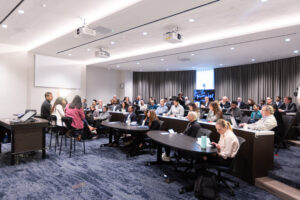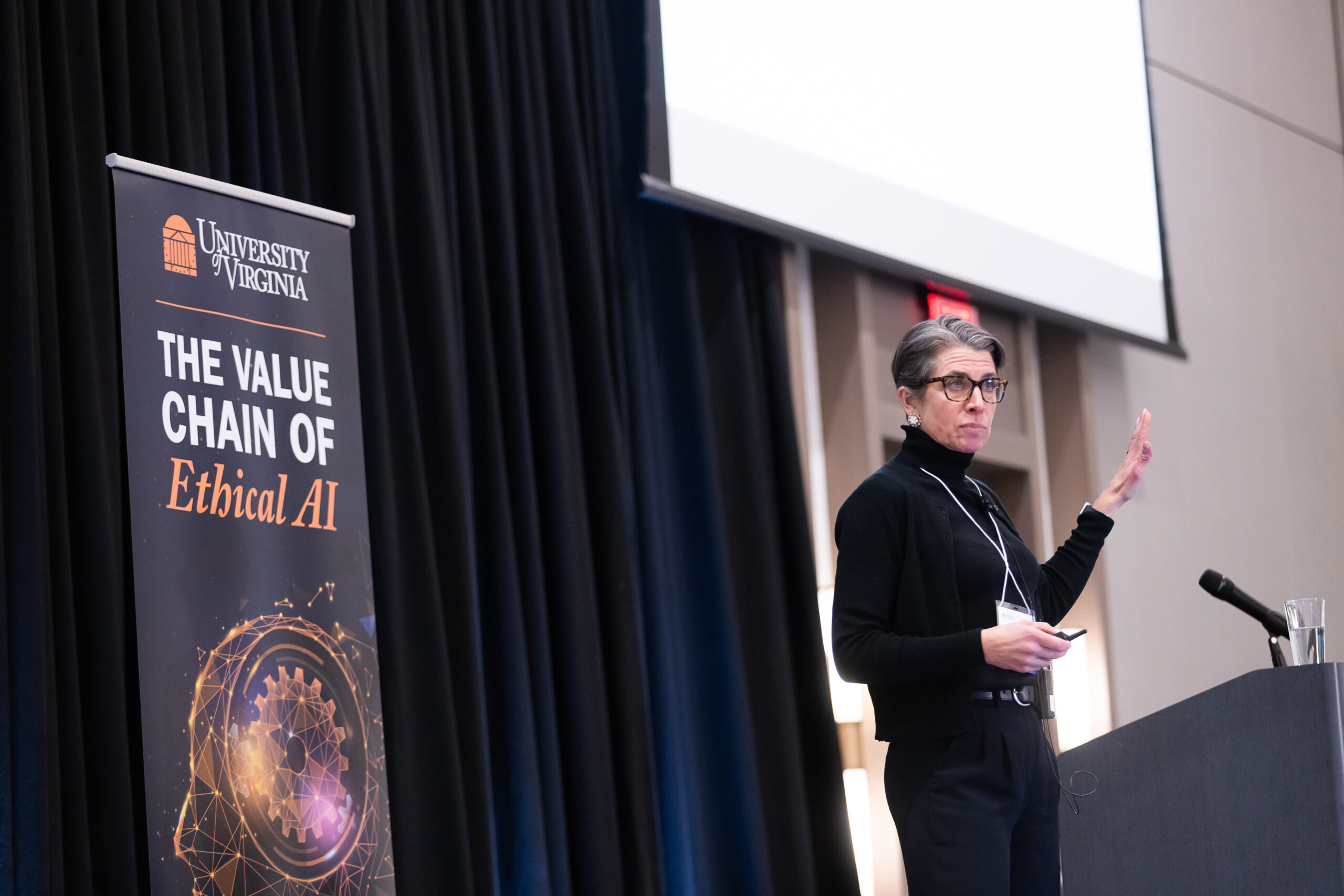
UVA Darden Conference Links Ethical Value Chain to AI Boom
By Dave Hendrick
The incredible growth of the artificial intelligence industry in recent years inspires excitement, wonder and no small amount of dread.
The promises of new workplace efficiencies and automation come hand-in-hand with fears of job losses. The awesome power of generative AI platforms means both sophisticated analysis and plagiarism has never been easier.
As AI-powered industries barrel headlong into an unknown future, the University of Virginia Darden School of Business is grappling with the many implications of AI’s peril and promise.
At the recent conference hosted by the LaCross Institute for Ethical Artificial Intelligence in Business, speakers from academia, government and industry sought to make sense of the once-in-a-generation technological marvel and the extraordinary ethical complications.

Welcoming attendees to the first public event for the newly launched institute, Dean Scott Beardsley, whose background includes a focus on the regulation of technology as well as the ethics of AI, recalled a paper he wrote in the 1990s titled “Broadband Changes Everything.” We are now similarly approaching an era in which it appears that AI may be changing everything, he said, with results akin to the widespread adoption of high-speed internet.
One of the key societal challenges will be to ensure the adoption and growth of AI technologies develops in a responsible manner, an outcome that is far from a given — particularly considering the many unknowns in a nascent space.
“Technology is a fast-moving topic, and progress in technology does not wait for certainty,” Beardsley said. “A lot of us are waiting for what’s absolutely going to happen, but I believe that the only thing that’s certain is uncertainty. I’m incredibly optimistic in some regards and I’m also very concerned.”
One of the challenges for individuals and organizations is to ensure AI develops in a way that contributes to human well-being and fulfillment, that AI is “at the service of humanity” and not “humanity at the service of AI,” Beardsley said.
“The Value Chain of Ethical AI” served as the conference theme and a foundational framework to enable leaders and scholars to consider the business and ethical issues that are a part of every aspect of developing and deploying AI in business.
From infrastructure and data, algorithms and applications, to impacts and people, and at all phases in between, business and ethical issues arise — often in tension — and must be addressed for AI to deliver on its promise ethically.
“We are suggesting that ethical AI is an outcome, not a product feature,” Marc Ruggiano (MBA’96), a director of the LaCross Institute, said. “It is the end result when a series of considerations across the AI value chain are addressed and tradeoffs among them are ethically made.”
The conference was organized to explore each phase of the value chain of ethical AI and encourage attendees to formulate an agenda to guide their journey with ethical AI over the coming years.
Introducing accountability
Offering one of the day’s keynotes, Notre Dame Mendoza Professor Kirsten Martin (MBA ‘99, Ph.D. ‘06), a leading authority on technology ethics, drew attention to value chain of ethical AI by noting the “value-laden” decisions made at nearly every step in AI development and deployment, an idea at odds with the claimed objectivity of much AI data.
Technology firms often claim an algorithm is an inscrutable “black box,” and attempt to sidestep their accountability by claiming outcomes are “objective, efficient and accurate,” she said.

“The idea of everything being more efficient — this idea of efficiency and accuracy and objectivity — is so pervasive in our assumption about AI that we don’t even stop to question what that’s glossing over and what that’s hiding,” Martin said, noting that the world was in the middle of a “hype bubble” around AI at present, with many in the industry positioning AI as an obvious positive.
The responsible development of AI would involve true accountability by those developing the technologies, particularly when firms exert power over stakeholders.
The development of new technologies often comes with companies attempting to sidestep accountability for the negative implications of the tech, but rather than being a stopping point, denying responsibility should instead be seen as fairly typical aspect of the development of new tech.
“We shouldn’t take it as a stopping point when they say we’re not accountable for these negative implications, we just should see it as an ongoing part of the practice of accountability,” Martin said. “Firms should expect to be accountable for their decisions that affect other people.”
A subject as increasingly pervasive as AI scrambles traditional considerations of who might be considered a stakeholder, Martin said, as they involve a significant number of “conscripted stakeholders,” or those who are not given the choice to whether to join into the firm’s value creation.
“We have a whole body of scholarship that assumes that all stakeholders are voluntary and they’re mutually beneficial in the relationship, otherwise they would leave,” Martin said. “So what happens if you have stakeholders who are the most impacted by the firm’s decisions, who are neither voluntary and for whom the decisions are not beneficial?”
The implications for management, leadership and scholarship are all significant when the “fundamental assumption” of mutually beneficial value creation is shaken, Martin said.
AI’s Strategic Value
Darden Professors Raj Venkatesan and Tom Davenport delivered separate keynotes exploring different facets of AI capabilities and implementation within companies. Venkatesan, author of The AI Marketing Canvas, offered examples of AI-related blunders as well as companies that were using AI capabilities to create personalized relationships with consumers, leading to greater engagement.
Generative AI fine-tuned by unique customer data possessed by a firm will increasingly be a source of competitive advantage, Venkatesan said, while looking ahead to a fraught frontier in which companies are increasingly interacting with an individual’s agentic AI, as opposed to the person themselves.
Davenport, the author most recently of All In On AI: How Smart Companies Win Big With Artificial Intelligence, said that for all of the excitement and trepidation, generative AI is typically still in the experimentation phase for companies, with relatively little production deployment. Davenport said most chief data officers believe that generative AI will transform their organizations, yet have generally “not yet figured out how to get real economic value of this technology,” with questionable data quality and uncertain use cases remaining hurdles.
Smart companies pursuing AI implementation are doing so in a deliberate manner using a process chain that progresses from strategy to use case to model development to deployment and finally, monitoring — a clear plan and the opposite of “random acts of AI.”
Partnering With AI
In addition to industry sessions on health care, technology and talent management, panels included sessions devoted to infrastructure, data, tools, applications, management and people, with conference organizers taking an expansive approach to what constitutes AI in 2024.
At a session devoted to essential leadership skills of the future, Darden Professor Roshni Raveendhran said humans continued to excel in what she termed composite intelligence, or the ability to combine physical, emotional and perceptual intelligence in order to plan and react in the manner required by a particular context. Such higher-level functioning continues to separate humans from AI, said Raveendhran, whose work often explores the influence of technology on individuals and organizations.
Raveendhran said she was particularly interested in the implications of human capabilities being augmented or changed when combined with new technologies.
“It’s not that AI can replace humans, but the idea that humans with AI could potentially replace the humans without AI,” said Raveendhran, adding that adoption of AI capabilities by organizations remains controversial in some sectors, using the example of students returning from summer internships reporting that their firms barred the use of generative AI tools.
“That’s going to change, because if those organizations have to adapt and learn, the people in those organizations are going to have to learn with AI, and learn how to deploy AI as opposed to just closing it off,” said Raveendhran. “It’s learning by partnering with AI.”
Darden Professor Gabrielle Adams said the rapid growth of AI will likely require changing both the way individuals learn and instruct.
“We really have to think very intentionally about how we are going to redo pedagogy, and really how we are going to change our psychology now that we have AI as a partner,” Adams said. “I don’t think we have built our education system for this.”
Ideas to Action
While the conference represented the first major event under the banner of the LaCross Institute, the event built on decades of ethical leadership activity at UVA and Darden.
The LaCross Institute, which was created in 2024 following the largest gift in Darden history from David LaCross (MBA ‘78) and his wife, Kathy, aims to ensure concepts such as business ethics and responsible leadership are embedded in the incredible opportunity surrounding AI. To do so will take focus and deliberate actions, UVA leaders know, and Darden Professor Yael Grushka-Cockayne concluded the conference with a planning session for what was termed the Ethical AI Agenda taking many of the ideas of the conference and turning them into opportunities for action.
Grushka-Cockayne urged attendees to prioritize increasing their AI acumen and building their organization’s AI capabilities over the next several years.
The University of Virginia Darden School of Business prepares responsible global leaders through unparalleled transformational learning experiences. Darden’s graduate degree programs (MBA, MSBA and Ph.D.) and Executive Education & Lifelong Learning programs offered by the Darden School Foundation set the stage for a lifetime of career advancement and impact. Darden’s top-ranked faculty, renowned for teaching excellence, inspires and shapes modern business leadership worldwide through research, thought leadership and business publishing. Darden has Grounds in Charlottesville, Virginia, and the Washington, D.C., area and a global community that includes 18,000 alumni in 90 countries. Darden was established in 1955 at the University of Virginia, a top public university founded by Thomas Jefferson in 1819 in Charlottesville, Virginia.
Press Contact
Molly Mitchell
Senior Associate Director, Editorial and Media Relations
Darden School of Business
University of Virginia
MitchellM@darden.virginia.edu




